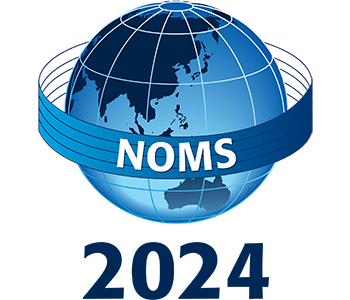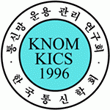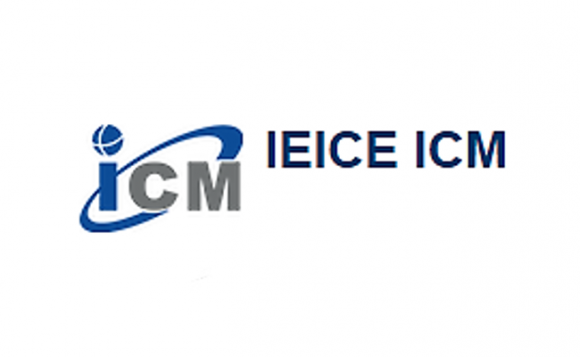All keynotes will be held in Gayageum A&B.
| Date / Time | Speaker | Title |
|---|---|---|
| Tuesday, May 7 11:00 - 11:45 |
Jinbae Hong | Network Innovation and the Future of Digital Transformation |
| Tuesday, May 7 11:45 - 12:30 |
Jongsik Lee | AI-Driven Evolution of Cloud-Native Networks |
| Wednesday, May 8 11:00 - 11:45 |
Deep Medhi | Revisiting Networking, Distributed Computing and Systems due to Huge Scientific Workflows with Implications for Monitoring and Management |
| Wednesday, May 8 11:45 - 12:30 |
Hanna Bogucka | Security of Open Radio Access Networks |
| Thursday, May 9 11:00 - 11:45 |
Charlie Zhang | 6G: Future Telecom for the AI Era |
| Thursday, May 9 11:45 - 12:30 |
Laurent Ciavaglia | What-If Networking |
Jinbae Hong
President, Institute of Information and Communications Technology Planning & Evaluation (IITP)
Title: Network Innovation and the Future of Digital Transformation
Abstract: Networks play a pivotal role as enablers of digital innovation, seamlessly integrating services, contents, and devices. From a global perspective, networks serve as the foundation and starting point for achieving digital co-prosperous society and civil rights. However, as infrastructure technologies, networks face challenges on their path to innovation. They require nationwide infrastructure development, significant amount of time, and exceptionally high levels of reliability. Additionally, network innovation must be intertwined with service innovation to foster widespread adoption. Korea has successfully overcome these hurdles through a harmonious combination of ‘proactive R&D & pilot projects’, ‘pro-competitive telecommunications policies including facility-based competition’, and ‘demand generation for convergent services’. In the era of digital transformation, the role of networks is to expand further. Future networks are expected to converge with AI, Software, Cloud Service and Security, etc., serving as accelerators of digital transformation. Korea remains committed to securing network innovation technologies across diverse fields including 6G and O-RAN to realize a sustainable future vision. Our aspiration is to drive collaborative research for network technology innovation and to share the benefits of the network with the world.
Bio: Dr. Jinbae Hong has been the president of the Institute of Information and Communications Technology Planning and Evaluation (IITP) since February 2024. In this role, he strives to secure Korea’s digital core strategic technologies, such as networks, cybersecurity, AI semiconductor, quantum, etc., to innovate the R&D system for them, to cultivate top-notch talents, such as master’s and doctoral level researchers and digital convergence experts, to boost the global ICT R&D capacity for international joint research, and to spread the R&D outcomes. Before this position, he was responsible for Korea’s next-generation network policy, communication industry policy, information security industry policy, etc. as the director general of the Office of Network Policy, the director of the Cyber Security and Network Policy Bureau, and the Telecommunication Policy Bureau at the Ministry of Science and ICT of the Korean government from 1996. He received his bachelor’s degree from Korea University in Seoul, Korea in 1995 and moved to the London School of Economics (LSE) for his master’s degree in 2005 and earned the Ph.D. in technology management from the University of Manchester in the UK in 2008. He is particularly interested in the fields of next-generation networks, artificial intelligence, cybersecurity-related ICT policy, technology development, human resource development, and infrastructure establishment.
Jongsik Lee
Head, Network R&D Lab, KT (Korea Telecom)
Title: AI-Driven Evolution of Cloud-Native Networks
Abstract: As AI and cloud technologies continue to reshape the telecommunications landscape globally, there's a burgeoning interest in migrating from traditional, hardware-centric network infrastructures to innovative systems and methodologies. KT is actively leveraging AI and cloud solutions to enhance network efficiency and elevate service quality. This keynote will delve into diverse use cases showcasing the optimization of network equipment and the enhancement of quality through AI-driven methodologies. Additionally, we will unveil a transition framework aimed at migrating network functions to cloud-based software, fostering enhanced flexibility and agility in service delivery. Practical insights and case studies elucidating the seamless integration of cutting-edge technologies into existing network architectures will also be shared. Join us as we unveil KT's forward-looking vision for the future of networking.
Bio: Jongsik Lee is currently responsible for leading Network R&D Lab, one of Network Group. He joined KT in 1998 and has worked on various wireless areas including 3G, Mobile WiMAX, and LTE-related R&D project. Since 2014, he has been leading LTE Evolution and 5G-related R&D projects. His latest contributions include developing, deploying and improving key 5G technologies leading up to and beyond KT’s commercial launch in 2019 and AI Operations 2.0 for network stability and survivability. He received the B.S. & M.S. degrees in Electrical Engineering from the Seoul National University in 1996 and in 1998, respectively. His main research areas were RF and microwave engineering.
Deep Medhi
Program Director, National Science Foundation (NSF)
 Title: Revisiting Networking, Distributed Computing and Systems due to Huge Scientific Workflows with Implications for Monitoring and Management
Title: Revisiting Networking, Distributed Computing and Systems due to Huge Scientific Workflows with Implications for Monitoring and Management
Abstract: Huge-scale scientific workflows arise in various scientific disciplines such as telescope-generated data (e.g., blackhole imaging), DNA sequencing, processing of Whole Slide Imaging for Digital Pathology, and so on. Handling them brings up new issues in networking, distributed computing, and systems, with the need to further understand network and systems management issues. The talk will focus on a few problem domains from scientific workflows, issues faced, and potential new opportunities.
Bio: Deep Medhi is a Program Director in the Computer & Network Systems (CNS) Division at the National Science Foundation (NSF), USA. He retired with the Curators' Distinguished Professor Emeritus status in 2022 from University of Missouri-Kansas City (UMKC), USA, which he joined in 1989. He was a rotating program director at NSF from August 2018 to August 2022 and took the permanent position at NSF in September 2022. He received B.Sc. in Mathematics from Cotton College, Gauhati University, India, M.Sc. in Mathematics from St. Stephen's College, University of Delhi, India, and his M.S. and Ph.D. in Computer Sciences from the University of Wisconsin-Madison, USA. Prior to joining UMKC in 1989, he was a member of the technical staff at AT&T Bell Laboratories from 1987 to 1989. While at AT&T Bell Labs, he co-developed Facility Diverse Routing - a feature that was deployed in AT&T's nationwide dynamic routing network. He is co-author of the books, "Routing, Flow, and Capacity Design in Communication and Computer Networks" (2004) and "Network Routing: Algorithms, Protocols, and Architectures" (1st edition,2007; 2nd Edition 2017), both published by Morgan Kauffman/Elsevier. He is a Fellow of the Institute of Electrical and Electronics Engineers (IEEE).
Hanna Bogucka
Professor, Poznań University of Technology (PUT)
 Title: Security of Open Radio Access Networks
Title: Security of Open Radio Access Networks
Abstract: The architecture of the 5G network and the prospective 6G network, will be almost entirely virtualized and based on software functionalities. These virtualization trends reach out all the way from the core to the Radio Access Network (RAN) functionalities. The open specification of the radio interface (Open RAN) allows for more competition in providing radio technologies with the required cost-efficiency, transparency, and security. A key element of Open RAN architecture is the Radio Intelligent Controller (RIC) managing execution of near real-time (near-RT) applications (xApps) and non-real-time (non-RT) ones (rApps). Artificial Intelligence (AI) and Machine Learning (ML) algorithms are planned to reside in near-RT RIC and non-RT RIC creating huge opportunities for automation of RAN operation. However, these additional functions, open interfaces, modified architecture, containerization and virtualization, SW and HW decoupling, and the open source code principle pose challenges regarding communication security, algorithms cybersecurity, and privacy of collected data. O the other hand, open architecture with embedded AI allows for running the specialized programming applications, which can continuously monitor and analyze security threats and protect RAN from malicious and illegal access to network segments. These opportunities and challenges will be discussed in the keynote.
Bio: Prof. dr hab. inż. Hanna Bogucka is a full professor and the Director of the Institute of Radiocommunications at Poznan University of Technology. Moreover, prof. Bogucka is the co-founder, Board Member and the Head of Cooperation of RIMEDO Labs, a spin-off from PUT. Prof. Bogucka is involved in research in the area of radio access networks (RANs): open RAN, RAN security, cognitive radio, and green communication. She has been involved in multiple European 5th – 7th Framework Programme and Horizon 2020 projects, European COST actions, National Science Centre projects, and industry cooperation. She is the author of over 200 research papers, 3 handbooks in the area of radio communications and digital signal processing (in Polish), and 3 scientific monographs on flexible and cognitive radio. Prof. Bogucka has been appointed IEEE Communications Society Director of the EAME Region (Europe, Africa, Middle East) and elected IEEE Radio Communications Committee Chair for the term of 2015-2016. Currently, she is the IEEE ComSoc Fog/Edge Industry Community Regional Chair in Europe, elected Member at Large of the IEEE ComSoc Board of Governors representing EMEA region (2023-2025), and a member of the Polish Academy of Sciences.
Charlie Zhang
SVP, Samsung Electronics
.jpg) Title: 6G: Future Telecom for the AI Era
Title: 6G: Future Telecom for the AI Era
Abstract: With the recent history and experience on 5G as the guide, we will share our perspective and shed some light on the initial 6G vision of bringing the next hyper-connected experience to every corner of life. We intend to provide a holistic view from an industry perspective that includes megatrends driving technology evolution towards 6G, new services envisioned and enabled, as well as technical requirements to realize these new services. We believe it is important that we take into consideration the lessons learned from 5G deployments, evolving market dynamics as well as emerging technology trends, in order to prepare well for the upcoming 6G. While 6G are still in its early days, a few emerging technology directions are taking shape and gaining momentum in academia and industry alike, including the support of new spectrum bands such as Upper Mid Bands, Energy-efficient Sustainable future networks, AI as a native part of the network design, ubiquitous coverage for future devices, etc.
Bio: Charlie Zhang is an SVP at Samsung Research America, where he leads research, prototyping, and standardization for 5G/6G and other wireless systems. He is also a Corporate VP and head of the global 6G team at Samsung Research. He is currently serving as the ATIS North America Next-G Alliance Full Member Group Vice Chair. He was the Board Chair of the FiRa Consortium from May 2019 to May 2023, and the Vice Chairman of the 3GPP RAN1 working group from 2009 to 2013, where he led development of LTE and LTE-Advanced technologies. He received his Ph.D. degree from the University of Wisconsin, Madison. Dr. Zhang is a Fellow of IEEE.
Laurent Ciavaglia
Head, Network Management Data and Intelligence, Nokia
 Title: AI for Network Automation
Title: AI for Network Automation
Abstract: It is undeniable that techniques, methodologies and tools stemming from the field of artificial intelligence has already started to play a key role in the evolution of networking technologies and is foreseen to play an even more important role in shaping how future networks, distributed systems are not only operated but also designed and deployed. This talk will look into the challenges of integrating AI techniques in and for networking and in particular will describe requirements and the development of network automation standards enablers to support this integration in end-to-end, multi-vendor infrastructures.
Bio: Laurent Ciavaglia is leading the network management, intelligence and data research and standards team at Nokia, and contributes to network automation technologies in various standards working groups and research communities. Prior, Laurent has worked with Rakuten Mobile and Rakuten Symphony as Head of Autonomous Networks Innovation Europe. He has extensive experience in inventing future network automation technologies with focus on intent-driven, zero-touch and artificial intelligence techniques. Laurent is an experienced standards contributor as editor and co-author of multiple specifications in the IETF, IRTF and ETSI in the fields of zero-touch networking, intent-based networking, autonomic networking, closed-loop automation, telemetry, and integration of machine learning and machine reasoning functionalities in networking environments. Laurent serves as co-chair of the IRTF Network Management Research Group (NRMG) and participates in standardization activities related to network and service automation in IETF, O-RAN, ETSI, ITU-T and TMF. Laurent is also a proud member of the IEEE network operations and management community (CNOM).














